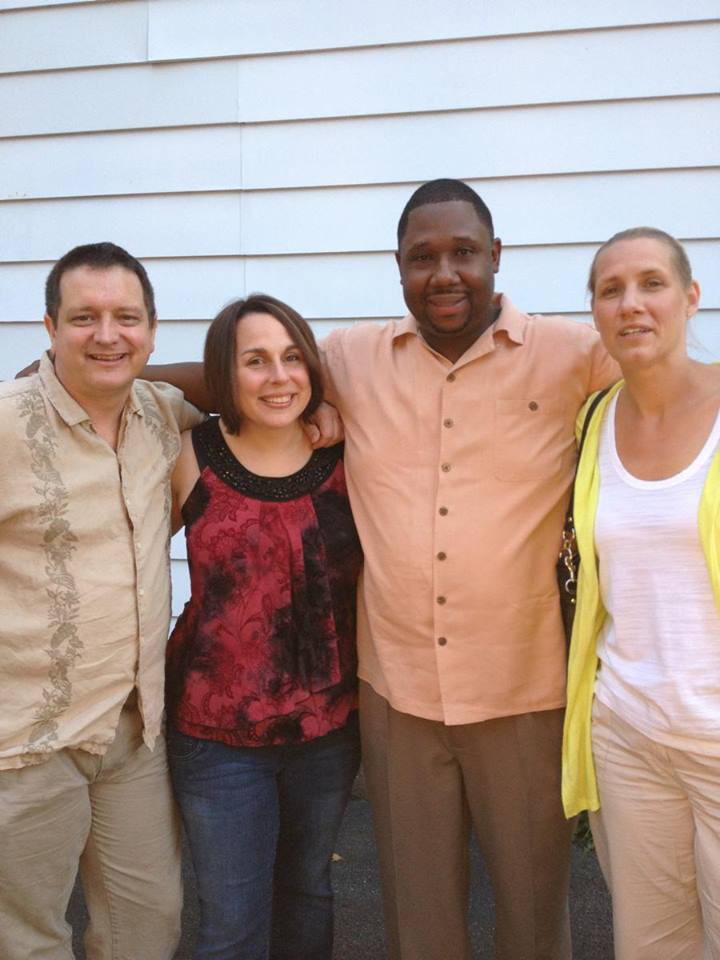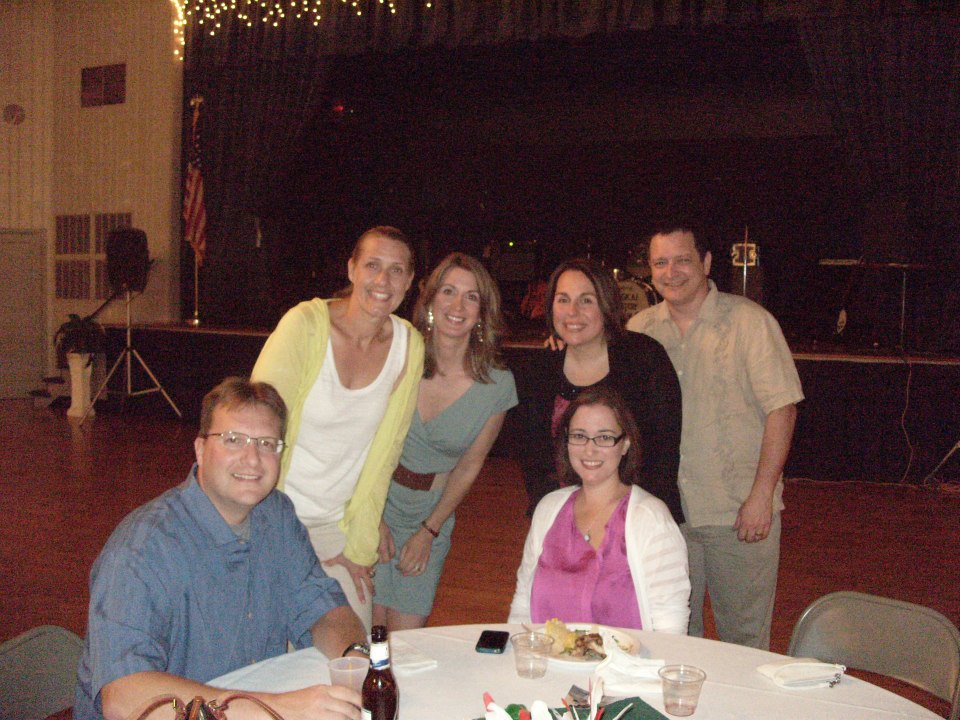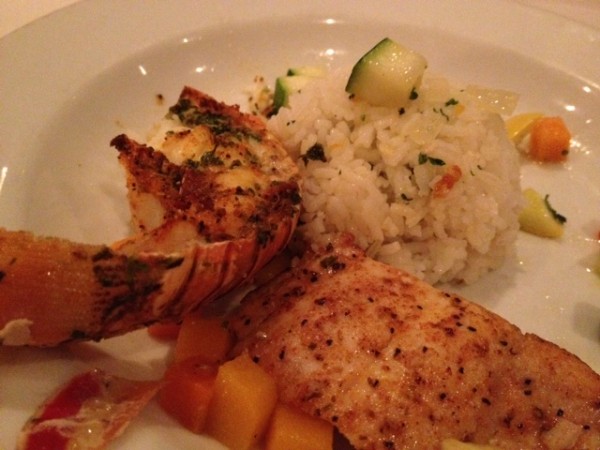
Since 1996 my husband Jay Carter of has been a part of my life. He is an incredible man but when I first met him, he lived a quite different life. I remember seeing his house for the first time and in his TV room was a GIANT can of processed nacho cheese, which he ate with his giant bags of nachos. He drank beer, lots of soda and smoked cigarettes. But one great thing he had going for his health is he was doing A LOT of manual labor everyday; sweating and getting cardiovascular exercise and strength building from his job. Over the years, his lifestyle improved drastically but he went from a manual labor job to a sit at a desk IT Job and he gained a lot of weight.
I have been blessed to see this man overcome addiction, improve his health and grow to learn and understand what keeps him healthy. Like all of us, he has the knowledge but doesn’t always practice it. Three years ago we have 2 little children and he had a workload that had him sitting 60 plus hours a week. So three years ago we moved to the woods of Florida and he got a little more active.
In the first few weeks of living in Florida and doing more manual labor, he lost 12lbs. He says, “I feel so good after sweating outside and accomplishing stuff.” He gets on the tractor, goes out in the woods, takes down a dead tree, cuts it up with a chainsaw, then brings it over to the splitter and then stacks it for us to use. Lots of work but it’s amazing how happy and healthy it is making him.
Over those 3 years he would go through cycles of weight loss and weight gain due to stress, illness, grief, and travel schedules. He would learn about and heal from adrenal fatigue. This past year he would challenge himself to do a Triathalon (in the ocean) when 3 months prior he didn’t even own a bike or know how to swim. He is amazing and you can read about his stories in previous blogs. I am so proud of what he has overcome and accomplished.
We need to recognize how important it is to have a Healthy Happy Husband. They are so vital to a healthy family. Here is another example of a man who decided to change his health, David. David’s tips and transformation should be an excellent example to all of us to get healthy and happy.
David’s story and tips:
We all know those people—or maybe you are one; you know, the type that likes to relive the “glory days” of younger years and how fantastic shape they were in. Chiseled abs, thick chest, 30 inch waist…and the list goes on. Up until last year I was that guy too. I had the same excuses as everyone else—college, marriage, kids (I have 3) and work. After over 10 years of being overweight, I decided I was no longer going to reminisce about how I used to be in good shape, I was going to be in good shape, no matter what it took.
I get asked frequently what I’m doing to lose weight—and it never fails that it’s difficult for me to answer succinctly. If I were to pin it to a single factor, it would simply be that I had a mindset change. That mental switch that flipped has led me to developing habits and thought processes which have ultimately changed my body.
1. Figure out your “why”
This probably sounds like “duh” but think about it for a minute. This journey isn’t going to be short or easy. Things will get tough. When it gets hard, you need to be able to focus on why you started in the first place. I have two key moments in my life that I will reflect back on to get me through sticking points and keep me moving.
2. Develop mental discipline
Through my experiences, one of the biggest contributing factors to dieting failure is lack of mental discipline. A lot of us don’t naturally have enough of this to get through a diet successfully/strictly for more than a few days –but the good news is that like other habits, it can be developed. I believe this is one of the MOST important aspects of change. You will constantly be bombarded with temptations: office parties, special events, family gatherings, spouses not on a “diet”, holidays. All these can easily derail your progress if you’re not prepared.
I’m not trying to say that junk food has to be 100% out of the diet, but it’s so easy to indulge here and there and before you know it, all your progress has been compromised. Unfortunately we can’t live in a junk food free bubble while dieting — even if we could, as soon as you come out you will not be equipped to handle it and probably end up back where you started.
3. Stop trying to out-work a bad diet
You can’t out exercise a bad diet, stop trying. I spent years in the gym trying to do this and I never experienced meaningful change until I got the diet right. Just look at all the people in the gym who spend HOURS every week doing cardio or lifting weights and yet still are overweight and out of shape. Conversely, look at people with a “clean” diet that don’t even bother with exercise. [I put clean in quotations because that actually opens up a whole can of worms that I can’t address simply.]
4. Plan ahead
I quickly discovered that if I wasn’t always thinking a day or two ahead to make sure I had the proper food in the fridge, I would get “stuck” being hungry with less than optimal foods around to eat.
5. Track your food intake
It’s so easy to track our food intake these days; most of us have a smart phone or at least a computer with an internet connection. I would recommend utilizing one of the many websites/apps that make this easy; I call it training wheels for losing weight.
My favorite app for doing this is My Fitness Pal. It has a huge food database and you can easily scan the barcode on just about anything and enter into your journal. I also love the ability to “remember” meals and create recipes. Inputting my food takes very little time every day after the initial learning curve. Yes, for this to be accurate you’re going to have to weigh/measure your food, at least initially until you get a good reference. Even after months of this, I still weigh and measure just about everything I eat. Otherwise you are just guessing.
Just recently I took tip 4 “plan ahead” and went a step further. Within the last couple of weeks I actually started to put my food in the day prior. Although this sounds extreme, it takes the emotion out of eating. When you’re faced with hunger it’s very easy to make a snap decision that usually hurts your long term goals. If you’re not ready to take this step, often times simply asking yourself “does this [insert food] help me reach my goals?”
6. Start with the big rocks
Remove sodas, excessive alcohol and fruit drinks from your diet and replace it with water or at least zero calorie options. There is a lot of debate over diet sodas and artificial sweeteners but I can tell you right now that excessive body fat is going to kill you faster than having some Aspartame or Splenda in a diet soda once in a while. If you eat fast food multiple times a week, eliminate it or reduce it severely. Yes you can lose weight eating fast food but it will make it slower and more difficult.
7. Exercise
Notice how far down the list exercise makes an appearance. People in the fitness industry often say body transformation is 70% diet, 30% exercise. I actually believe diet is more important than that. Exercise is the catalyst for change; a good diet lets it happen. Yes you can lose “weight” without exercise, however, exercise does speed up the process and helps to maintain lean body tissue while under a caloric deficit. As most people know, muscle tissue burns more calories at rest than fat so keeping as much muscle as possible should be a priority. Plus, muscle is what gives your body the good kind of curves.
8. Set realistic goals
You didn’t get overweight overnight and getting back into shape isn’t going to happen overnight either. Be patient but persistent. I found that for me, setting 5lb. short term goals kept me pushing toward my long term goals.
9. Take pictures/measurements
The scale is a liar. Even more so if you’re engaging in any significant amount of exercise. I’ve found that pictures and measurements taken at regular intervals is better feedback for how I’m progressing than the scale—especially as I get leaner and have less fat to lose.
10. Eat mostly whole food
Base the majority of your intake around whole foods—lean meats, eggs, whole grains, fruits and vegetables. Personally, I avoid anything that comes out of a bag or box.
11. Make it a lifestyle, not a diet
All diets work great. The problems arise when you stop the diet and go back to eating like you did before. Confession: this started as a diet for me. Eventually I realized that if I went back to eating what I used to then I would go back to looking that way too.
Disclaimer: This information is not meant to diagnose, prescribe, treat or cure any illness or disease. It’s strictly for informational, educational, or entertainment purposes ONLY. The products I talk about are not meant to diagnose, prescribe, treat or cure any illness or disease. Any information I give you about them is for informational or entertainment purposes only. They have not been evaluated or approved by the FDA. Please seek the qualified health professional of your choice when making health decisions for yourself, your family and your pets.










